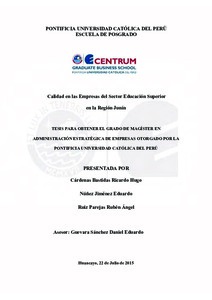| dc.contributor.advisor | Guevara Sánchez, Daniel Eduardo | |
| dc.contributor.author | Cárdenas Bastidas, Ricardo Hugo | |
| dc.contributor.author | Núñez Jiménez, Eduardo | |
| dc.contributor.author | Ruiz Parejas, Rubén Ángel | |
| dc.date.accessioned | 2019-08-23T16:22:52Z | |
| dc.date.available | 2019-08-23T16:22:52Z | |
| dc.date.created | 2015-07 | |
| dc.date.issued | 2019-08-23 | |
| dc.identifier.uri | http://hdl.handle.net/20.500.12404/14799 | |
| dc.description.abstract | La calidad educativa es una necesidad preponderante en las empresas del sector
educación en el nivel superior de la región Junín, esta investigación buscó identificar el nivel
de cumplimiento de los nueve factores de éxito de la calidad total (TQM) en estas
organizaciones, como: (a) Gestión de calidad del Proveedor, mide el manejo de sistemas de
calidad con los proveedores; (b) La Alta Gerencia, vela por el funcionamiento y la
implementación de la gestión de calidad; (c) Planeamiento de la Calidad, analiza si las
organizaciones cuentan con metas detalladas y específicas para implementación de la gestión
de calidad; (d) Auditoria y Evaluación de la Calidad, realiza un seguimiento constante a la
política y planes de calidad; (e) Diseño del Producto, permite adoptar la innovación como
aspecto diferenciador en el entorno; (f) Mejoramiento de Procesos, verifica si el proceso
operativo satisface los requerimientos de los clientes y, si las instalaciones y los equipos
funcionan adecuadamente; (g) Educación y entrenamiento, mide si el personal de la
organización se encuentra capacitado en el uso de herramientas TQM; (h) Círculos de la
Calidad, considera el diálogo de la empresa con sus colaboradores y el trabajo en equipo; (i)
Enfoque hacia la Satisfacción al Cliente, mide el grado de satisfacción del cliente con
respecto a los productos ofrecidos. El diseño de la investigación posee un enfoque
cuantitativo, transeccional descriptivo; se plantearon 35 preguntas tomadas a los directores,
técnicos, docentes de las empresa del sector en Educación Superior de la Región Junín, la
encuesta fue tomada a una muestra de 53 empresas de una población de 96, se consideró un
promedio simple para el modelo matemático, que se consigue del promedio obtenido por
cada pregunta. Obteniendo como resultado que muchas instituciones de este sector no están
desarrollando una tendencia hacia la calidad, ya que tienen deficiencias respecto a diseño del
producto, gestión de la calidad de los proveedores, círculos de calidad y principalmente no
están considerando la calidad dentro de su planeamiento. | es_ES |
| dc.description.abstract | The quality of education is a necessity in the leading companies in the sector higher
education in the Junin region, this research sought to identify the level of compliance with the
nine factors of success of the total quality management (TQM) in such organizations as: (a)
Management of supplier quality, measured the management of quality systems with
suppliers; (b) The Top Management, sailing for the operation and implementation of quality
management; (c) planning the quality, looks to see if the organizations are provided with
detailed and specific goals for implementing quality management; (d) audit and evaluation of
the quality, is a constant monitoring to the policy and quality plans; (e) product design,
allows you to take the Innovation as differentiator in the environment; (f) improvements in
processes, verifies if the operating process meets the requirements of the clients, and, if the
facilities and the equipment work properly. (g) education and training, measured if the
organization's staff is trained in the use of TQM tools; (h) of the Quality Circles, considers
the dialog of the company with its partners and the team work; (i) approach toward customer
satisfaction, measures the degree of customer satisfaction with regard to the products offered.
The research design has a quantitative approach, transactional descriptive, were raised 35
questions taken to the directors, engineers, teachers of the companies in the sector Higher
Education of the Junin Region, the poll was taken to a sample of 53 companies from a
population of 96, was considered to be a simple average for the mathematical model, which is
accomplished in the average obtained by each question. Obtaining as a result that many
institutions in this sector aren't developing a trend toward quality, since they have
shortcomings with respect to product design, management of the suppliers' quality, quality
circles and mainly are not considering the quality within their planning. | es_ES |
| dc.language.iso | spa | es_ES |
| dc.publisher | Pontificia Universidad Católica del Perú | es_ES |
| dc.rights | info:eu-repo/semantics/openAccess | es_ES |
| dc.rights.uri | http://creativecommons.org/licenses/by-nc-nd/2.5/pe/ | * |
| dc.subject | Calidad total | es_ES |
| dc.subject | Educación superior--Perú--Junín | es_ES |
| dc.subject | Investigación cuantitativa | es_ES |
| dc.title | Calidad en las empresas del sector educación superior en la región Junín | es_ES |
| dc.type | info:eu-repo/semantics/masterThesis | es_ES |
| thesis.degree.name | Maestro en Administración Estratégica de Empresas | es_ES |
| thesis.degree.level | Maestría | es_ES |
| thesis.degree.grantor | Pontificia Universidad Católica del Perú. CENTRUM | es_ES |
| thesis.degree.discipline | Administración Estratégica de Empresas | es_ES |
| renati.advisor.dni | 09412483 | |
| renati.advisor.orcid | https://orcid.org/0000-0002-6374-8062 | es_ES |
| renati.author.dni | 20114889 | |
| renati.author.dni | 20055386 | |
| renati.author.dni | 41935833 | |
| renati.discipline | 413307 | es_ES |
| renati.level | https://purl.org/pe-repo/renati/level#maestro | es_ES |
| renati.type | https://purl.org/pe-repo/renati/type#tesis | es_ES |
| dc.publisher.country | PE | es_ES |
| dc.subject.ocde | https://purl.org/pe-repo/ocde/ford#5.02.04 | es_ES |






